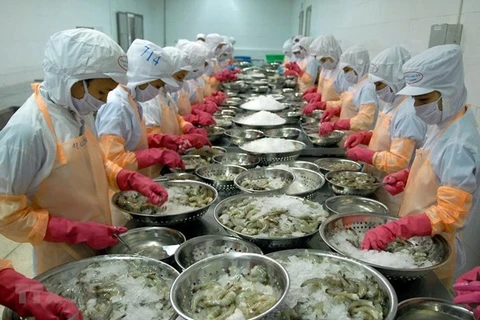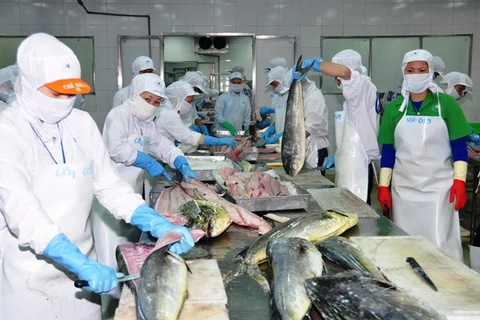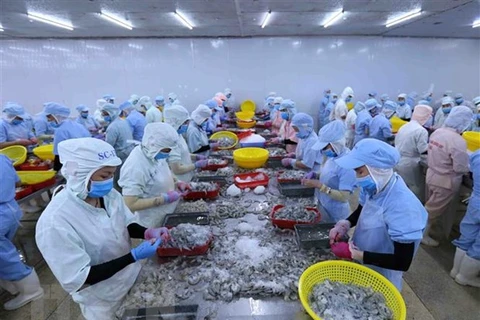Long An (VNS/VNA) - The Mekong Delta province of Long An plans to invest more than 1.24 trillion VND (53 million USD) to develop brackish water shrimp cultivation in the 2020-25 period, according to its Department of Agriculture and Rural Development.
During the period, the province will use 588 billion VND (25 million USD) from the central Government budget to upgrade infrastructure for shrimp fry production and pilot shrimp breeding areas and specialised shrimp breeding areas.
The province will also use 33 billion VND (1.4 million USD) from its budget to monitor the environment and disease, transfer breeding techniques, and promote shrimp trade.
The province also seeks 624 billion VND (26.6 million USD) from breeders and investors for pond infrastructure, shrimp fry and shrimp food purchases, and shrimp breeding facilities.
Specialised shrimp breeding areas in Can Duoc, Can Giuoc, Tan Tru and Chau Thanh districts will be set up.
The province plans to have 6,800ha of brackish water shrimp, including 200 ha of hi-tech breeding areas, with an annual output of 15,000 tonnes this year.
Dinh Thi Phuong Khanh, deputy director of the department, said the province would apply advanced breeding techniques to increase yield, protect the environment, and develop shrimp cultivation sustainably.
The province will cooperate with research institutes, universities and companies to apply advanced breeding technologies for high-quality fry.
Advanced breeding technologies like biofloc technology and two-stage shrimp breeding technology will be applied to manage water quality.
Under this type of breeding, juvenile shrimp are first bred in a nursery pond for a few weeks before being moved to the main pond. The beds of ponds are covered with plastic sheets and the surfaces of the ponds are covered with anti-sunshine nets.
The ponds are also equipped with fans and pumps to generate oxygen for the water. Wastewater released from the ponds is treated thoroughly to avoid contaminating the surrounding environment.
Advanced breeding technologies can help farmers breed three to four shrimp crops a year, increasing output on the same farming area.
Shrimp will be bred under Vietnamese and global good agricultural practices (VietGAP and GlobalGAP) standards and Aquaculture Stewardship Council (ASC) standards. The province will grant a code for each qualified shrimp breeding pond for traceability to serve export requirements.
Shrimp farmers are encouraged to join co-operative groups and co-operatives to link with companies in shrimp production and consumption. Companies will supply shrimp fry, feed, and breeding techniques for farmers and guarantee outlets for them.
The province targets having nine advanced shrimp breeding areas with a total of 500ha by 2025./.
VNA























